12 Best Sustainable and Ethical Coffee Brands for 2025: A Cup of Change

-
My Five Criteria For Evaluating Sustainable Coffee Brands
- 1. Organic Certification:
- 2. Fair Trade Certification:
- 3. Shade-Grown Coffee:
- 4. Direct Trade:
- 5. Environmental Initiatives:
-
Twelve Best Sustainable Coffee Brands
- 1. Equal Exchange:
- 2. Birds and Beans:
- 3. Kicking Horse Coffee:
- 4. Dean's Beans:
- 5. Counter Culture Coffee:
- 6. Tiny Footprint Coffee:
- 7. Peace Coffee:
- 8. Ethical Bean Coffee:
- 9. Jim’s Organic Coffee
- 10. Conscious Coffee
- 11. Higher Ground Roasters
- 12. Grounds for Change
-
Final Thoughts on Sustainable Coffee Brands
Disclosure: Some of the links in this article may be affiliate links, which can provide compensation to me at no cost to you if you decide to purchase. This site is not intended to provide financial advice and is for entertainment only.
As coffee lovers, we often relish the comforting aroma and rich taste of our morning cup of joe.
But, have you ever stopped to consider your coffee's impact on the environment?
“For every cup of coffee consumed, it is almost certain that one square inch of rainforest was destroyed. Chemical buildup in soils and loss of forest shade are consequences of mass coffee production.” - Amanda Varsho
Sustainable coffee brands are companies that prioritize environmental stewardship and ethical practices throughout their supply chains.
These brands go above and beyond to ensure that their coffee is produced to minimize harm to the environment and support the well-being of coffee farmers and workers.
From sourcing beans through fair trade partnerships to implementing eco-friendly farming practices, these twelve brands aim to create a positive impact from bean to cup.
So, how did I evaluate the sustainable coffee brands?
My Five Criteria For Evaluating Sustainable Coffee Brands
When it comes to choosing sustainable coffee brands, it is important to consider a set of criteria that can help guide your decision-making process.
These criteria can ensure that the coffee you purchase not only meets your taste preferences but also aligns with your values and supports ethical and environmentally friendly practices.
I typically look at five factors when evaluating sustainable coffee brands.
1. Organic Certification:
I look for coffee brands that have obtained an organic certification, particularly USDA Organic.
Although there are several different organic certifications out there, make sure they are from reputable third-party organizations. Don’t fall victim to greenwashing.
The organic certification ensures that the coffee beans have been grown without the use of harmful pesticides and herbicides, minimizing the impact on ecosystems.
2. Fair Trade Certification:
Fairtrade certification guarantees that the coffee farmers have been paid fair wages for their labor and provided safe working conditions.
By choosing brands with this certification, you can contribute to the well-being of coffee farmers and their communities.
Similar to the organic certification, several different fair trade certifications exist.
Make sure the fair trade certification is from a reputable organization.
3. Shade-Grown Coffee:
Coffee grown under the shade of trees helps protect natural habitats and preserves biodiversity.
By choosing shade-grown coffee brands, you support sustainable farming practices and contribute to the conservation of ecosystems.
“There are two types of coffee plants, those that grow in sun and those that grow in shade. The sun-grown coffee plant has been tailored to produce nearly three times as much coffee as the shade version. Increased production of sun-grown coffee plants results in greater loss of rainforest.” - Amanda Varsho
4. Direct Trade:
Coffee brands that engage in direct trade work directly with coffee farmers, bypassing middlemen.
This ensures that the farmers receive a higher share of the profits, fostering long-term relationships and promoting sustainable business practices.
5. Environmental Initiatives:
Consider coffee brands that demonstrate a commitment to environmental sustainability through initiatives such as carbon offsetting, water conservation, waste reduction, and reforestation efforts.
I also love it when companies are B corporations or members of 1% for the Planet.
These efforts showcase a brand's dedication to minimizing its ecological footprint.
By considering these five criteria, you can make a conscious choice that supports ethical and environmentally responsible practices within the coffee industry.
Remember, every cup of coffee you enjoy can make a difference.
Twelve Best Sustainable Coffee Brands
Here are some of the top sustainable coffee brands that you can feel good about supporting:

1. Equal Exchange:
Amazon Customer Review: 4.5 out of 5
USDA Organic Certified
Price: $11.57 for 12 oz
This worker-owned cooperative sources its coffee directly from small-scale farmers who are paid fair trade prices for their beans.
They prioritize organic farming methods and invest in community development projects.
Equal Exchange roasts their beans at their solar-powered roastery in Massachusetts.
Coffee Beans Source: 40 small farmer organizations around the world.
You can purchase Equal Exchange on Amazon with this link, here.
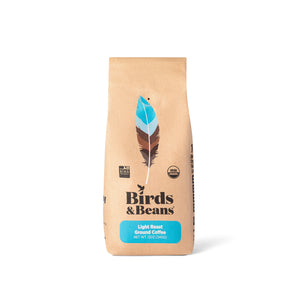
2. Birds and Beans:
Amazon Customer Review: Not sold on Amazon
USDA Organic Certified
FairTrade Certified
Price: $17.94 for 12 oz
This Canadian company is committed to shade-grown USDA Organic coffee, which helps protect bird habitats and promotes biodiversity.
They also ensure fair compensation for farmers and use environmentally friendly packaging.
Birds and Beans give back 5% of every bag of coffee sold to their conservation partners.
Coffee Beans Source: Family farms in Nicaragua, Honduras, Guatemala, and Peru
3. Kicking Horse Coffee:
Amazon Customer Review: 4.5 out of 5
Ecocert Organic Certified
Fairtrade Certified
Price: $8.49 for 10 oz
With a focus on organic and fair-trade Arabica beans, Kicking Horse Coffee is dedicated to supporting sustainable agriculture.
Their coffee is shade-grown on small-scale farms that are less than 5 Hectares (Ha) in size.
Coffee Beans Source: Indonesia, Central & South America
You can purchase Kicking Horse Coffee on Amazon with this link, here.

4. Dean's Beans:
Amazon Customer Review: Not available on Amazon
Certified Organic by Bay State Organic Certifiers
FairTrade Federation Member
Price: $19.59 for one pound
This Massachusetts-based employee-owned coffee roaster sources its beans from small farmers and cooperatives worldwide.
They support social justice initiatives and donate some of their profits to organizations working for positive change.
Environmental Initiative: Solar-powered roasting facility - offsets 79% of electricity.
Coffee Beans Source: Colombia, Timor, Ethiopia, Guatemala, Honduras, India, Indonesia, Mexico, Nicaragua, Papua New Guinea, Peru

5. Counter Culture Coffee:
Amazon Customer Review: 4.5 out of 5
Offers organic and conventional coffee
Certified B Corporation
Price: $18.89 for 12 oz
Known for their direct trade relationships and sustainable farming practices, Counter Culture Coffee is dedicated to quality and transparency.
They work closely with farmers to improve their livelihoods and ensure environmentally-friendly production.
Additionally, the company sets aside one penny from every pound of coffee sold into a fund for sustainability projects around the globe (over $50,000 raised annually).
Counter Culture Coffee has also been measuring and offsetting their carbon footprint since 2010. They have partnered with Trees, Water & People (TWP)
Coffee Beans Source: Not Listed, Company has stated that 71% of its coffee came from producers we worked with for five or more years.
You can purchase Counter Culture Coffee on Amazon with this link, here.

6. Tiny Footprint Coffee:
Amazon Customer Review: 4.5 out of 5
USDA Certified Organic
Most are Fair Trade or Rain Forest Alliance Certified
Price: $18.90 for 16 oz
Known for its carbon-negative coffee, Tiny Footprint Coffee keeps raising the bar in sustainability.
For every pound of coffee sold, the company donates a portion of the proceeds to fund reforestation in Honduras.
Tiny Footprint Coffee sources its shade-grown Arabica coffee beans from around the world. They are also dedicated to sourcing from women coffee producers consistently.
Coffee Beans Source: Colombia, Honduras, Guatemala, Congo, Mexico, Honduras, Nicaragua, Ethiopia, Peru, Sumatra, Java, Papua New Guinea
You can purchase Tiny Footprint Coffee on Amazon with this link, here.
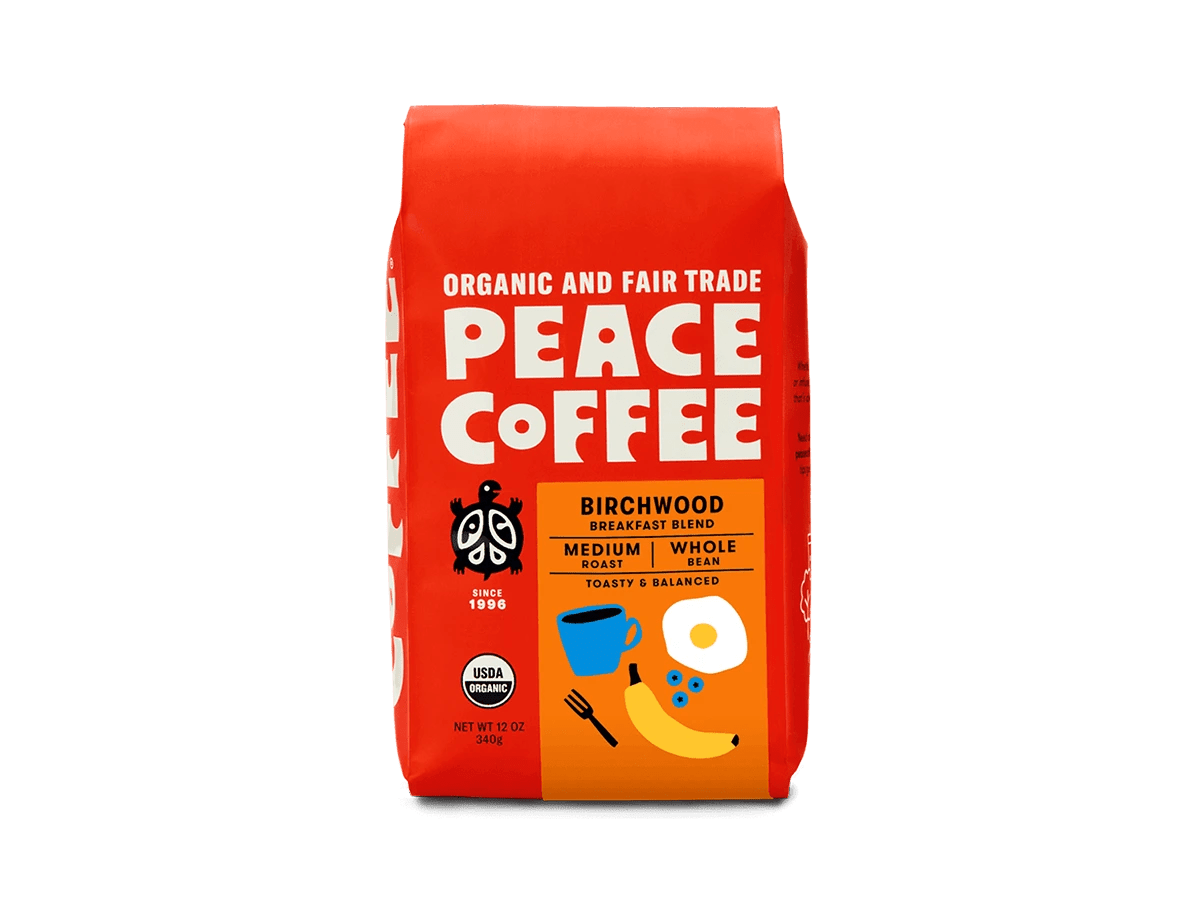
7. Peace Coffee:
Amazon Customer Review: 4.6 out of 5
Certified B Corporation
Fair Trade
Shade-grown
USDA Certified Organic
Price: $27.99 for 20 oz
Peace Coffee began purchasing coffee from Guatemala in 1997 after a partnership was formed with Nobel Peace Prize winner, Rigoberta Menchu.
Inspired by the Guatemalan Peace Accords signed in 1996, the company originally sold this offering as Guatemalan Peace Coffee.
Peace Coffee imports directly from their small-scale farmer partners to create a fairer, more transparent and sustainable system of coffee trade.
Coffee Beans Source: Guatemala, Honduras, Peru, Ethiopia, Colombia, Nicaragua, and Sumatra
You can purchase Peace Coffee on Amazon with this link, here.
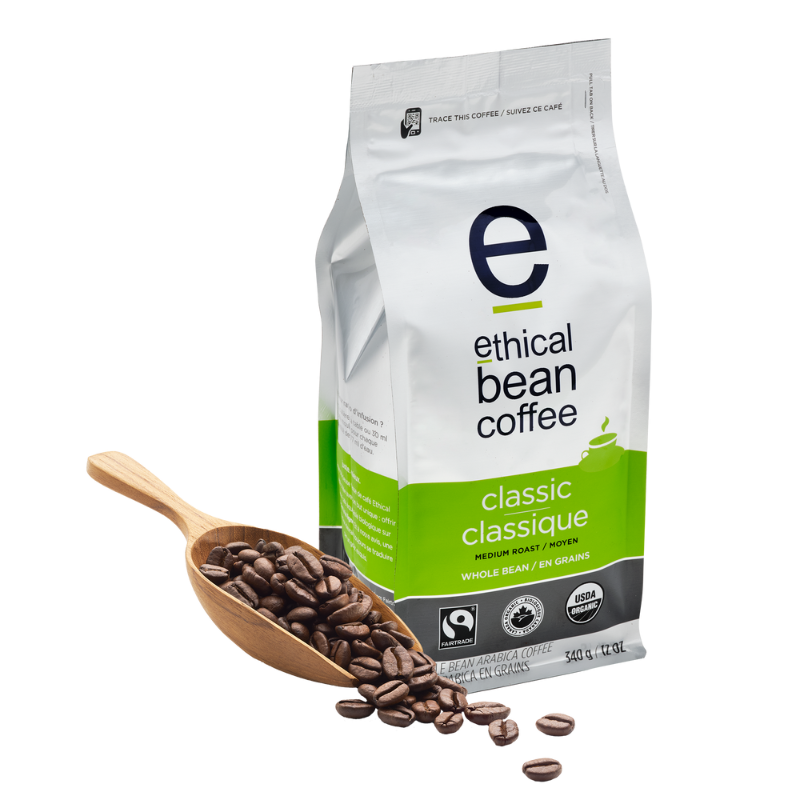
8. Ethical Bean Coffee:
Amazon Customer Review: 4.4 out of 5
Fair Trade Certified
USDA Organic Certified
Price: $8.99 for 8 oz
Ethical Bean Coffee wants you to feel confident in your cup of joe. They’ve put a unique QR code on every bag that will tell you where your coffee was grown, when it was roasted, who roasted it, and more.
The company lives by the simple words: leave your mark, but tread lightly.
Ethical Bean Coffee partnered with Bullfrog Power to purchase natural gas and green fuel for their head roastery and vehicle fleet.
Coffee Beans Source: Primarily from South and Central America
You can purchase Ethical Bean Coffee on Amazon with this link, here.
9. Jim’s Organic Coffee
Amazon Customer Review: 4.3 out of 5
Fair Trade Certified
USDA Organic Certified
Certified B Corporation
Price: $16.99 for 12 oz
Jim’s Organic Coffee is all shade grown, fairly traded, and certified organic by USDA and Oregon Tilth.
All of the energy for their offices and roasting plant comes from renewable sources.
Jim’s Organic Coffee has partnered with small charities to support children’s educational and community development projects in coffee-producing countries.
Coffee Beans Source: Colombia, Guatemala, Costa Rica, Mexico, Ethiopia, Papua New Guinea, Indonesia, and Sumatra
You can purchase Jim's Organic Coffee on Amazon with this link, here.
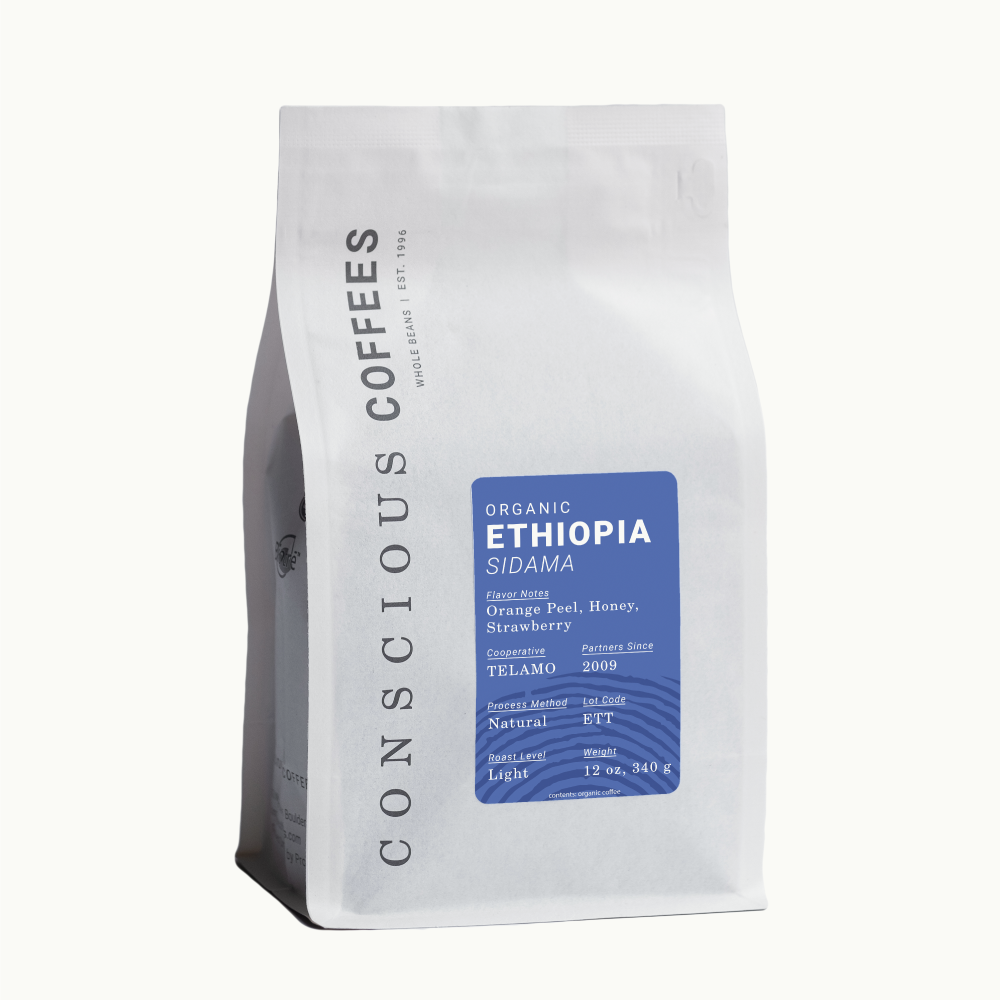
10. Conscious Coffee
Amazon Customer Review: Not available on Amazon
Fair Trade Certified
USDA Organic Certified
Certified B Corporation
Price: $14.00 - $18.00 for 12 oz
Family owned company since 1996. Roastery is based in Boulder, Colorado.
The company roasts every small batch of beans to order.
Conscious Coffee joined Cooperative Coffees in 2004 and imports directly from producing cooperatives.
Coffee Beans Source: Ethiopia, Honduras, Colombia, Sumatra, Mexico, Guatemala,

11. Higher Ground Roasters
Amazon Customer Review: Not available on Amazon
Fair Trade Certified
USDA Organic Certified
Price: $14.99 - $16.99 for 12 oz
Higher Ground Roasters purchase and roast exclusively 100% certified organic, Fair trade, and shade grown coffee.
The company purchases wind power credits to offset their daily energy usage through Renewable Choice Energy.
Higher Ground Roasters has also with non-profits such as the Alabama Rivers Alliance, Black Warrior RiverKeeper, Cahaba River Society, and Freshwater Land Trust.
Coffee Beans Source: Bolivia, Ethiopia, Guatemala, Mexico, Papua New Guinea, Peru, and Sumatra
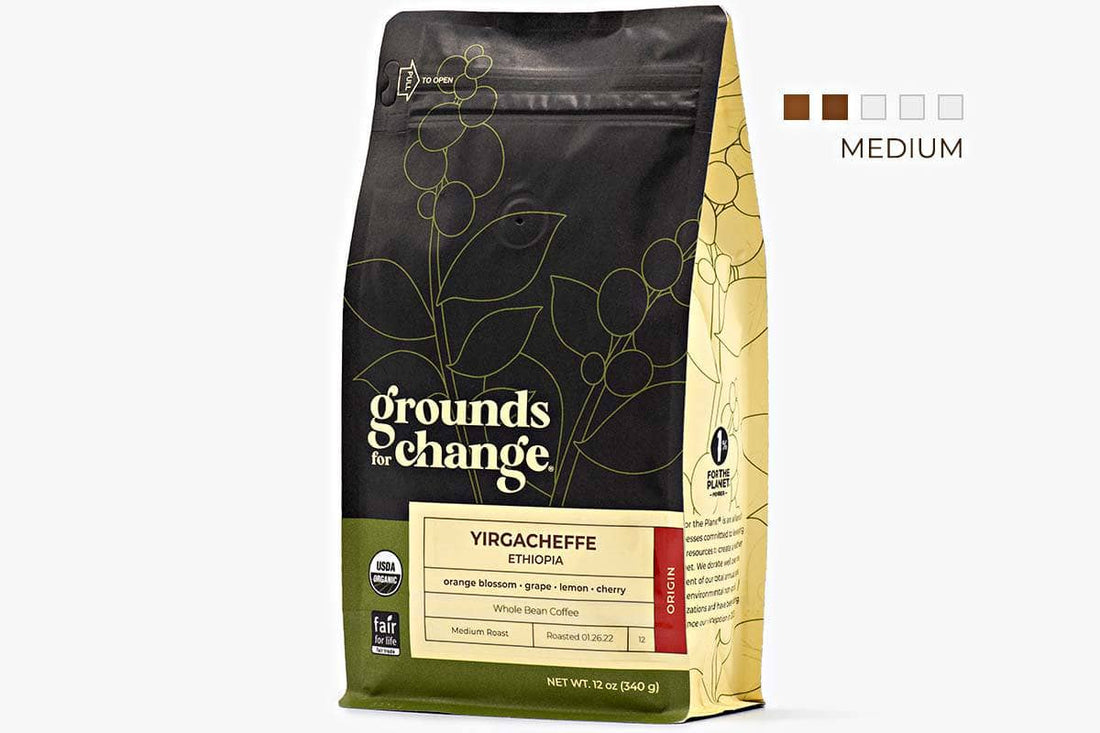
12. Grounds for Change
Amazon Customer Review: Not available on Amazon
Certified B Corporation
Fair for Life Fair Trade
USDA Organic Certified
Price: $14.96 - $18.00 for 12 oz
Grounds for Change is a family-owned and operated coffee roasting business located near Seattle, Washington.
The company roasts its organic and fair trade coffee in small batches.
Grounds for Change uses 100% renewable energy and offsets its carbon footprint with tree planting. They are certified carbon-free by CarbonFund.org.
Additionally, the company upcycles all its empty burlap coffee bags by donating them to local organic farmers for weed suppression and erosion control.
They also upcycle all of their coffee chaff (an organic by-product of the roasting process) by giving it to local organic farmers to be used as a nitrogen-rich soil amendment.
Lastly, Grounds for Change works closely with organizations such as Rainforest Trust, Seattle Audobon Society, Save Our Wild Salmon, Cafe Femenino, and other non-profits.
Coffee Beans Source: Guatemala, Congo, Nicaragua, Honduras, Ethiopia, Sumatra, and Peru
Final Thoughts on Sustainable Coffee Brands
Sustainable coffee brands offer an ethical and environmentally friendly alternative to conventional coffee options.
These brands prioritize fair trade, organic farming practices, and community development.
By supporting these brands, we can contribute to a more sustainable and just coffee industry.
As the demand for sustainable products continues to grow, it is encouraging to see more coffee companies embracing sustainable practices and working towards a better future.
Whether you enjoy a morning cup of coffee or indulge in a mid-day pick-me-up, choosing sustainable coffee brands allows you to savor your favorite beverage while positively impacting the world.
So, next time you reach for a bag of coffee beans or order a cup of espresso, consider choosing a sustainable coffee brand and join the movement towards a more sustainable and socially responsible coffee industry.
-
My Five Criteria For Evaluating Sustainable Coffee Brands
- 1. Organic Certification:
- 2. Fair Trade Certification:
- 3. Shade-Grown Coffee:
- 4. Direct Trade:
- 5. Environmental Initiatives:
-
Twelve Best Sustainable Coffee Brands
- 1. Equal Exchange:
- 2. Birds and Beans:
- 3. Kicking Horse Coffee:
- 4. Dean's Beans:
- 5. Counter Culture Coffee:
- 6. Tiny Footprint Coffee:
- 7. Peace Coffee:
- 8. Ethical Bean Coffee:
- 9. Jim’s Organic Coffee
- 10. Conscious Coffee
- 11. Higher Ground Roasters
- 12. Grounds for Change
-
Final Thoughts on Sustainable Coffee Brands
Disclosure: Some of the links in this article may be affiliate links, which can provide compensation to me at no cost to you if you decide to purchase. This site is not intended to provide financial advice and is for entertainment only.




